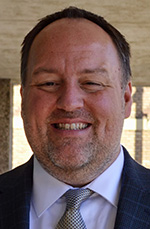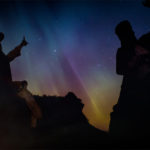By random accident of geography, over half the world’s population celebrates Christmas during a time of the year associated with winter. Actually, almost 90 percent of people live in the northern hemisphere, but about half the world live at a latitude that actually “feels” winter.
 Craig NashMost of us know this cognitively, and we occasionally ponder how strange it would be to see Mr. and Mrs. Claus in board shorts and sunglasses. But I doubt we’ve given much thought to how this has informed the way we experience Christmas.
Craig NashMost of us know this cognitively, and we occasionally ponder how strange it would be to see Mr. and Mrs. Claus in board shorts and sunglasses. But I doubt we’ve given much thought to how this has informed the way we experience Christmas.
Advantages to winter
There are advantages to having a winter Christmas, when the days are shorter and the weather colder. Or, in the case of most of us Texans, less warm.
It lends itself to quiet reflection. The colder weather sends us inside in search of warmth, family and friends, as well as the comfort of sweaters and warm socks. Turning our attention to the Christ-Child, we carry that insular, introspective spirit with us as we reflect on the loneliness of Mary, the confusion of Joseph and the joy of the world. Both the minor keys of Advent and the major keys of Christmas allow us to process the Good News in our heads and in our hearts with reserve, as we ponder what it meant for our previous year, and what it will mean for the coming one.
 Feels like “summer”
Feels like “summer”
But for some of us, 2016 has made this Advent and Christmas season feel more summer-ish. The year has been an alarm. Not a fire alarm sending us running out the building, or a siren leaving us wondering what’s going on, but a wake-up call.
Cities are falling as innocent children dodge bullets to escape. Many of these children are being told by the wealthiest, most elaborate inn on the planet: “We are full here. Can’t risk what you may bring with you. Find shelter elsewhere.”
Some of our neighbors are fearful for their lives as they walk down the streets or are pulled over for broken taillights. Many tell them that this fear is irrational: “Do as you are told, and everything will be OK.” Sign the census, pledge allegiance to Caesar, and your anxiety will fade.
Other neighbors are labeled “violent,” associated unfairly with actual violent people who claim, erroneously, to practice the same faith. Regardless of how cooperative and kind they are, these neighbors often have to take different routes home, out of fear for what may befall them if they are in the wrong place at the wrong time.
Wake up and get busy
I’m writing this on the day before an anticipated 45-degree drop in temperatures and five days before the shortest day of the year in my corner of the world. But I’m not feeling that. I’m feeling summer, the time to wake up and do something.
In the next week, I’ll sing “O Come, O Come Emanuel,” “O Holy Night” and “Silent Night” in solidarity with my community, but what I’m feeling is the prophetic words from Isaiah, “Arise, shine, for your light has come, and the glory of the Lord rises upon you!”
I’m pondering the words of Mary, devastating to some and revelatory for others, that “He has cast down the mighty from their thrones and has lifted up the lowly, he has filled the hungry with good things and the rich he has sent away empty.”
Friends, it may be cold and dark outside, but the sun is rising. May this Christmas be a time for us all to begin waking up and doing something.
Craig Nash is a child hunger outreach specialist and the No Kid Hungry regional coordinator for the Texas Hunger Initiative, based in Baylor University’s Diana Garland School of Social Work.















We seek to connect God’s story and God’s people around the world. To learn more about God’s story, click here.
Send comments and feedback to Eric Black, our editor. For comments to be published, please specify “letter to the editor.” Maximum length for publication is 300 words.